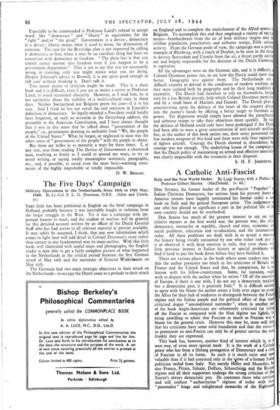The Five Days' Campaign
VERY little has been published in English on the brief campaign in Holland, probably because it was inevitably fought in isolation from the larger struggle in the West. Yet it was a campaign with im- portant lessons to teach, and the student of warfare will be grateful for this detailed account written by an officer of the Dutch General Staff who has had access to all relevant material at present available. It may safely be assumed, I think, that any new information which comes to light later'will add detail to Colonel Doorman's story rather than correct in any fundamental way its main outline. With this little book, well illustrated with useful maps and photographs, the English reader is now able to get a fairly complete picture of what happened in the Netherlands in the critical period between the first German attack of May loth and the surrender of General Winkelaaann on May 15th.
The Germans had two main strategic objectives in their attack on the Netherlands—to occupy the Dutch coast as a prelude to their attack on England and to complete the encirclement of the Allied armies Belgium. To accomplish this end they employed a variety of tact means—bombardment from the air of both military targets and civilian population, parachutists and airborne troops, Fifth col activity. From the German point of view, the campaign was a perf example of Blitzkrieg, with a touch of Douhet, to be seen in the thr to destroy Rotterdam and Utrecht from the air, a threat partly carri out and largely responsible for the decision of the Dutch Comma to capitulate.
All the advantages were on the German side, and it is difficult, Colonel Doorman points out, to see how the Dutch could have do better. Geography was against them. The Netherlands are difficult country to defend in the conditions of modern warfare, a they were isolated both by geography and by their long tradition neutrality. The Dutch had therefore to rely on themselves, help only by a few British aircraft, help which Colonel Doorman mentio and by a small force of Marines and Guards. The Dutch plan concentrating upon the defence of the heart of the country play- into the enemy's hands by offering a better target to German air power. Yet dispersion would simply have allowed the parachuti and airborne troops to take their objectives more quickly. In fa the defence of Holland could only have been prolonged if the Dut had been able to mass a great concentration of anti-aircraft artillen but, as the author of this book points out, their army possessed v few modern weapons of this kind and there were only four squadro of fighter aircraft. Courage the Dutch showed in abundance, b courage was not enough. The underlying lesson of the campaign that the Dutch policy of maintaining an armed and effective neutralit3 was clearly impossible with the resources at their disposal.
S. H. F. JOHNSTON.


























 Previous page
Previous page